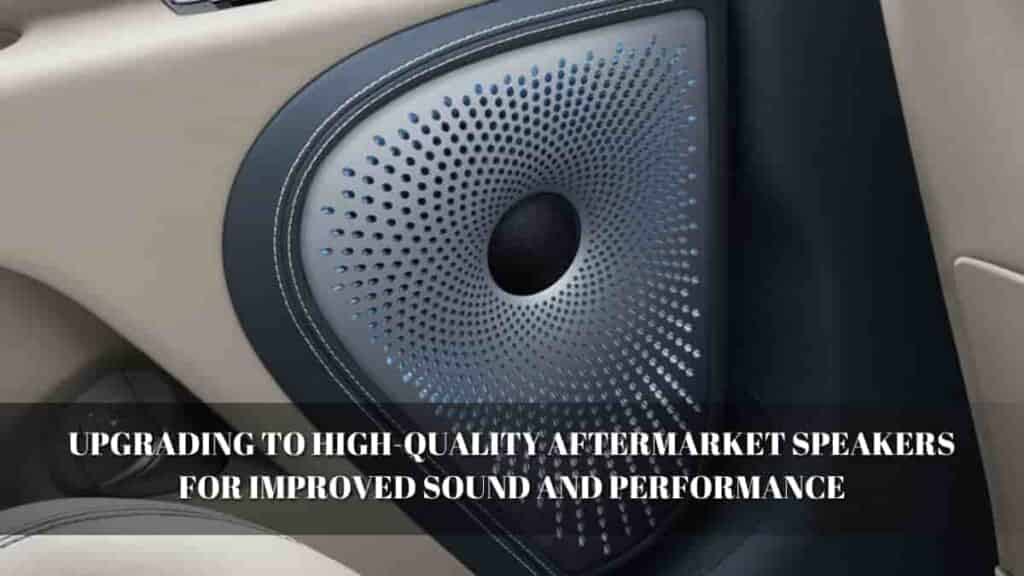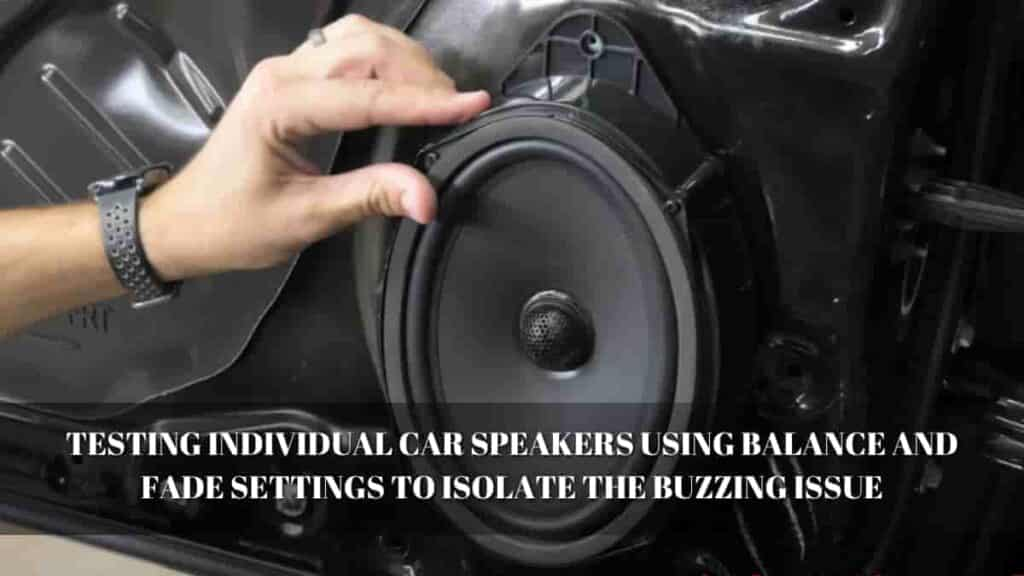Table of Contents
Crank up your favorite song in the car only to be greeted by an irritating buzzing sound from your speakers, which is rather frustrating. This problem usually arises when the loudness is increased, therefore destroying your driving attitude and perhaps harming your audio system. You are not alone if you are experiencing this humming sound issue; the good news is you can resolve it.
More often than you may imagine, car speakers buzz; it can originate from a few sources including damaged components, loose wiring, interference, or erroneous audio settings. Fortunately, the majority of these issues are simple to spot and solve alone. Everything you need to know about resolving car speaker buzzing noise at high volume will be covered in this article. From knowing the reasons to using realistic fixes, you’ll acquire easy, step-by-step instructions for restoring crystal-clear sound in your car.
Quick Reference Table: Car Speaker Buzzing Troubleshooting Overview
| Problem Area | Possible Cause | Fix Recommendation | Tools Needed |
| Speaker Cone | Physical damage or wear and tear | Inspect and replace if torn | Screwdriver, Replacement speaker |
| Wiring & Connections | Loose or frayed wires | Reconnect or replace faulty wires | Wire stripper, Multimeter |
| Ground Loop Interference | Improper grounding | Install ground loop isolator | Ground loop isolator |
| Amplifier Distortion | Overloaded or low-quality amplifier | Adjust gain, check amp rating | Multimeter, Amp manual |
| Head Unit/Equalizer Settings | Bass or volume too high | Rebalance EQ settings | None |
| Speaker Mounting | Poor mounting or vibrations | Re-tighten or insulate speaker | Foam tape, Screwdriver |
Understanding Why Speakers Buzz at High Volume

Understanding what makes automobile speakers buzz before you get to the repairs is essential. Hardware as well as software components could cause the problem.
1. Speaker Damage or Wear
Speakers have suspensions, cones, and coils among other sensitive components. Over time or from too much usage, they can tear or change. The speaker is unable to vibrate properly and makes a distorted or buzzing sound when this occurs.
2. Bad wire connections
Poor current flow resulting from loose or corroded speaker wires can cause buzzing at higher volumes when more power is required. It’s akin to attempting to sip a thick milkshake through a straw with holes—it won’t pass smoothly.
3. Ground loop problems
An electrical fault known as a ground loop happens when several devices using various ground pathways interfere with the grounding of the audio signal. Particularly at louder volumes, this usually produces a hum or buzzing.
4. Amplifier Difficulties
Your speakers can get distorted signals from an underpowered or improperly set amplifier. Too much gain can push too much power into the speakers, producing a humming sound.
5. Settings for Head Unit or Equalizer
Occasionally it is just about the settings. Too much bass, treble, or general volume can generate a humming noise especially if your speaker system is not meant to manage such output.
6. Loose Speaker Installations
Mechanical vibrations can also cause buzzing. Even a flawless signal can sound distorted if the speaker is not firmly fixed or if there is no cushioning material surrounding it.
Step-by-Step Guide to Fixing the Buzzing Noise
Step 1: Test the Source
Before pulling your entire car apart, determine where the buzzing is coming from.
- Play music at low, medium, and high volumes.
- Listen to which speaker(s) are buzzing.
- Switch between radio, Bluetooth, and AUX to isolate the issue.
Pro Tip: Use a balance and fade adjustment to focus sound on individual speakers.
Step 2: Inspect Speaker Cones
Open your car door panels or dashboard (wherever the speaker is mounted) and visually inspect the speaker cones.
- Look for tears, punctures, or warped cones.
- Gently press the cone. If it feels stiff or grinds, it’s likely damaged.
Solution: Replace damaged speakers with ones of similar impedance and size.
Step 3: Check Wiring and Connections
Loose, corroded, or frayed wires can interrupt clean signal flow.
- Disconnect the car battery.
- Pull the speaker out and inspect all wiring.
- Use a multimeter to test continuity and resistance.
Solution:
- Re-solder or replace any loose or frayed wires.
- Use proper connectors and secure them tightly.
Step 4: Diagnose Ground Loop Interference
If the buzzing only occurs when certain accessories are plugged in (like chargers or aftermarket devices), it may be a ground loop issue.
Solution:
- Install a ground loop isolator between the head unit and amplifier or between your auxiliary source and head unit.
- Ensure all audio devices share the same grounding point.
Step 5: Fine-Tune Your Amplifier
Amplifiers are a common source of distortion at high volumes.
- Check that your amplifier’s wattage matches your speakers’ ratings.
- Turn the gain knob down a little and test again.
- Use bass boost sparingly, if at all.
Pro Tip: If your amp is too powerful or too weak for your speakers, consider upgrading one or the other for compatibility.
Step 6: Adjust Equalizer Settings
Sometimes, your sound system is just trying too hard.
- Turn down the bass and treble in your head unit’s equalizer.
- Set all settings to flat and increase gradually.
- Avoid setting volume levels past 80% of maximum.
Pro Tip: Overdriving your head unit can result in “clipping,” where the signal gets distorted before it even reaches the amplifier.
Step 7: Secure the Speaker Mounting
Loose speaker mounts or rattling panels can mimic speaker buzzing.
- Ensure the speaker is tightened securely into the panel.
- Use foam tape or rubber gaskets around the speaker rim to absorb vibration.
- Check for rattling trims or panels around the speaker.
Step 8: Replace Old or Low-Quality Speakers
Sometimes, the speakers are simply worn out or not made for high-volume output.
Solution:
- Upgrade to high-quality aftermarket speakers.
- Match impedance (measured in ohms) and power ratings with your amplifier or head unit.
- Consider brands like Pioneer, JBL, or Rockford Fosgate for solid mid-range options.
Preventive Measures to Avoid Future Buzzing

Fixing the buzzing is one thing—keeping it from returning is another. Here’s how you can make your fix last:
- Avoid max volume settings, which strain your components.
- Regularly inspect wiring and connectors for wear.
- Use sound-deadening materials like Dynamat to minimize vibration.
- Keep your audio system professionally installed if unsure about wiring.
- Update firmware on your digital head unit if buzzing seems to be software-related.
When to Seek Professional Help
If you’ve tried everything and the buzzing still won’t go away, it may be time to see a car audio professional. Hidden issues like amplifier clipping, short circuits, or internal head unit faults can be complex and dangerous to handle yourself.
Look for help if:
- The buzzing persists across all sources and volumes.
- Your system was recently upgraded or modified.
- You’re unfamiliar with electrical work.
Also Read : Fix My Speaker
Final Thoughts
Loud car speakers humming can destroy your musical experience, yet the cure is sometimes easier than it seems. Many of the solutions—from tightening a few screws to replacing a torn cone or fine-tuning EQ levels—are budget-minded and do-it–yourself-friendly.
The solution is to methodically separate the problem and address it piece by piece. Your car’s sound system can sound as good as new with some patience and meticulous attention to detail.
Let small problems not compromise your pleasure and sound quality. Investing a little bit of time now will help you to avoid future frustration and cost. Thus, the next time that buzz begins creeping in during your favorite jam, you will know precisely what to do: reduce the irritation and increase the clarity.
